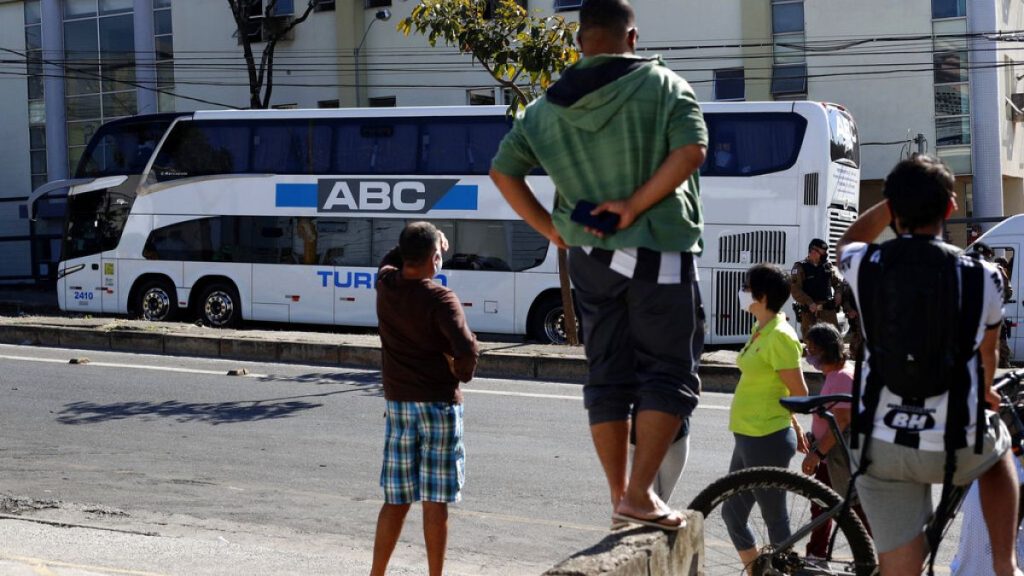The pre-Christmas serenity of Minas Gerais, a state nestled in southeastern Brazil, was shattered in the early hours of a fateful day by a horrific highway collision involving a passenger bus and a truck. The devastating crash claimed the lives of 38 individuals, casting a pall of grief and sorrow over the festive season. Thirteen other passengers, clinging to life amidst the wreckage, were rushed to hospitals near the city of Teofilo Otoni, their fates hanging precariously in the balance. The ill-fated bus, carrying 45 passengers, had embarked on its journey from Sao Paulo, its destination now forever unreachable. By Saturday afternoon, rescue teams had completed the grim task of recovering all victims from the mangled remains of the vehicles, paving the way for an official investigation to unravel the sequence of events that led to this calamitous loss of life.
Preliminary accounts from witnesses paint a conflicting picture of the tragedy’s unfolding moments. Some recounted a sudden tire blowout on the bus, rendering the driver helpless to avert a collision with the oncoming truck. Others offered a different narrative, suggesting that a granite block, dislodged from an unknown source, struck the bus, potentially initiating the chain of events. Adding to the complexity of the scene, a car carrying three passengers also became entangled in the collision, though miraculously, all three occupants escaped with their lives. The investigation, burdened with piecing together these fragmented accounts, will be tasked with determining the definitive cause of the accident and providing answers to the grieving families.
The tragedy sent shockwaves through the highest echelons of Brazilian leadership. Governor Romeu Zema, deeply affected by the scale of the devastation, swiftly ordered a “full mobilization” of the Minas Gerais government, directing all available resources towards assisting the victims and their families. His public pronouncements reflected a profound sense of sorrow and a commitment to providing compassionate support to those grappling with the unimaginable loss just days before Christmas. He emphasized the government’s dedication to ensuring that the families receive the necessary support to navigate this tragedy with the utmost dignity and humanity.
President Luiz Inácio Lula da Silva, echoing the nation’s collective grief, expressed his profound condolences and offered his prayers for the families of the deceased. He assured the affected community that federal officials were ready to provide any necessary assistance to the state of Minas Gerais. His words, reflecting the gravity of the situation, underscored the national outpouring of sympathy and support for those touched by the tragedy. The accident serves as a stark reminder of the fragility of life and the unexpected turns of fate that can transform moments of joy into profound sorrow.
The Minas Gerais bus crash, tragically, is not an isolated incident on Brazil’s roads. National statistics reveal a deeply concerning trend of traffic fatalities, with over 10,000 lives lost in 2024 alone, according to the Ministry of Transportation. This sobering figure underscores the urgent need for comprehensive road safety reforms and increased public awareness campaigns to combat the pervasive dangers on Brazilian highways. The frequency of such accidents necessitates a thorough examination of existing safety measures and a commitment to implementing effective strategies to prevent future tragedies.
Just months before the Minas Gerais catastrophe, in September 2024, another bus accident claimed the lives of three members of a Brazilian football team, the Coritiba Crocodiles. En route to a championship game in Rio de Janeiro, their journey was abruptly cut short when their bus overturned, transforming a moment of anticipation and excitement into one of profound loss. The tragic incident led to the cancellation of the championship game, a somber reminder of the human cost of road accidents. These repeated occurrences highlight the pressing need for systemic changes to improve road safety and protect the lives of all who travel on Brazil’s highways.














